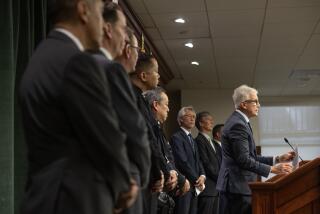Bobby Joe Maxwell, suspected L.A. serial killer whose convictions were overturned, dies at 69
Less than a year after prosecutors dropped all charges against him, a man once accused of killing 10 homeless people in a string of downtown murders has died.
Bobby Joe Maxwell, 69, died in a Los Angeles hospital late last month, said one of his longtime attorneys, Fred Alschuler.
He was buried in his hometown of Columbia, Tenn., where he had asked to be laid to rest if he ever left police custody, according to his sister, Rosie Harmon. A graveside service was held Thursday.
Maxwell endured a decades-long legal odyssey that saw prosecutors brand him the Skid Row Stabber, only for his convictions to be overturned when it was uncovered that the informant who testified against him was a fraud.
His case gained renewed attention last year, when it was revealed that the Los Angeles County district attorney’s office was still attempting to retry him for the downtown slayings, despite the fact that he had slipped into a near comatose state in late 2017.
Prosecutors eventually dropped all charges in August 2018, after physicians from L.A. County-USC Medical Center testified that Maxwell was unlikely to recover from a massive heart attack that left him unable to move or speak.
“Mr. Maxwell was a man of great spiritual dignity,” Alschuler said. “He is missed by all who knew him.”
The deaths of 10 homeless men in October and November of 1978 were attributed to the Skid Row Stabber. The victims were Jesse Martinez, 50, Jose Cortez, 32, Bruce Emmet Drake, 46, J.P. Henderson, 65, David Martin Jones, 39, Francisco Perez Rodriguez, 57, Frank Floyd Reed, 36, Augustine Luna, 49, Jimmie White Buffalo, 34, and Frank Garcia, 45.
Maxwell was arrested in 1979 and convicted in two of the slayings at a 1984 trial. The same jury acquitted him of five counts of murder and deadlocked on three others.
Los Angeles police had arrested and later released two other suspects in the killings before settling on Maxwell, whose palm print was found on a bench near one of the crime scenes. Investigators also said they found a knife in Maxwell’s possession that was similar to the type of blade suspected of causing the fatal wounds suffered by some of the victims.
Maxwell always proclaimed his innocence, and his attorneys and relatives have long argued the case was overly reliant on the testimony of a jailhouse informant, Sidney Storch, who claimed Maxwell had confessed to him.
Storch would later be revealed as the architect of a sprawling scandal inside the county’s jail system. Several informants said Storch taught them how to “book” other inmates by gleaning details about high-profile cases from newspapers and using that information to allege they confessed.
Storch died in 1988 after he was indicted on a perjury charge. Despite the controversy, Maxwell’s conviction would not be overturned until 2010, when an appellate court ruled that much of the evidence against him beyond Storch’s testimony was “circumstantial.”
But he would never see the outside of a jailhouse or hospital room again. The district attorney’s office sought to retry him on five of the murder charges in 2013, but voluminous discovery requests and lengthy motion hearings delayed the case up until Maxwell fell gravely ill in late 2017.
“I was hoping and praying that he would wake up one day and find out that he was a free man, but he’s free from everything now,” Harmon said Friday. “God called him home and he’s there now.”
Twitter: @JamesQueallyLAT
More to Read
Start your day right
Sign up for Essential California for news, features and recommendations from the L.A. Times and beyond in your inbox six days a week.
You may occasionally receive promotional content from the Los Angeles Times.






